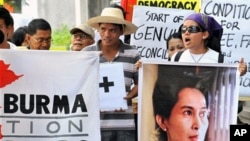Burma rights and exile groups want the international community to denounce the government's preparations for elections this year, saying they are undemocratic and are increasing ethnic tensions.
A coalition of rights groups and political exiles on Friday said election laws released last week confirm that Burma's military government intends to use the elections to legitimize its rule.
The coalition, called Burma's Movement for Democracy and Ethnic Rights, wants foreign governments to reject the elections.
The election laws require parties to purge political prisoners from their ranks, including detained opposition leader Aung San Suu Kyi.
The rules also require allegiance to the controversial 2008 constitution, which reserves a quarter of all parliamentary seats for the military.
Khin Ohmar is with the Forum for Democracy in Burma, which is part of the coalition. She says military rule would ensure continued ethnic oppression and human rights abuses.
"And, it's not only us here on the border but also the people in the country, whose voice cannot be raised and heard freely, are saying the same thing - this is the constitution forced by the regime to adopt in 2008. And this is the constitution that has actually given a sole power, overarching power, to the military regime in all three branches of the government," she said.
The United States has called the laws a mockery that will ensure the elections lack credibility. The U.S. and several other governments have imposed sanctions on Burma because of its poor human rights record.
But Burma's closest neighbors have said little, preferring diplomatic engagement.
The coalition Friday also expressed concern about increased hostilities against ethnic militias, including those that have cease-fire agreements with the government.
Ahead of the elections Burma's military has been trying to force the militias to consolidate as a border security force.
Zipporah Sein is general secretary of the Karen National Union, which has been fighting authorities in eastern Burma for decades.
"They [militias] do not accept the 2010 election, they do not accept to become the border guard force," she said. "So, the regime also sends troops to their areas. And, for their part, it is possible when they were forced and when they were attacked, so it surely that the fighting will be broke [will break] out again," said Sein.
Burma has yet to announce a date for the elections, the first in two decades, but says they will take place this year.
Aung San Suu Kyi's National League for Democracy won Burma's last elections but the military refused to hand over power and has kept her under house arrest for most of the time since.
The coalition Friday stopped short of calling for an election boycott and acknowledged that some opposition politicians, including within the NLD, want to take part in the elections.
The NLD is to announce later this month if it will participate.













